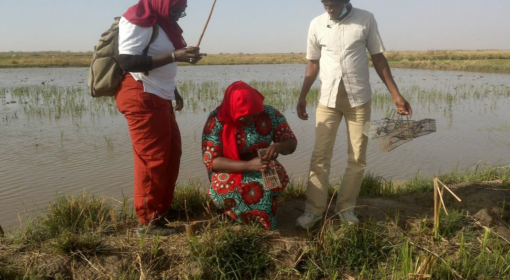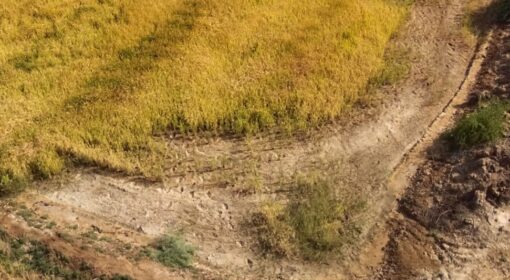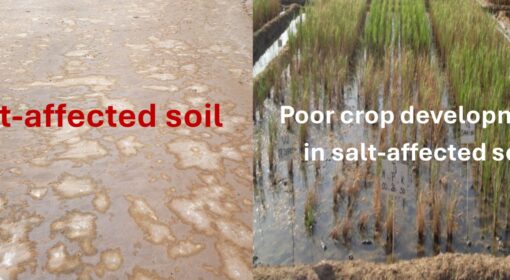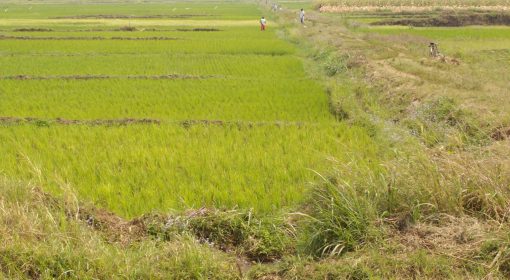By AfricaRice and MetaMeta
Pour la version en français, cliquez ici.
Salinisation is swiftly emerging as a major global challenge for food production. Coastal areas and deltas are increasingly experiencing salinity intrusion due to tidal dynamics and rising sea levels, adversely affecting agricultural production. This salinity greatly hampers crop development and growth, posing a significant threat to food security, biodiversity, and the livelihoods of millions of people worldwide.
Salinity in Senegal – mitigation or adaptation?
Also in the Senegal River Valley, salinisation is a major challenge. There, it is the most prevalent form of soil degradation, severely limiting rice yields. This undermines agricultural productivity, devalues land, and threatens Senegal’s food sovereignty. It has been reported that salinity affects 1.7 out of the 3.8 million ha of cultivable land of Senegal, leading to rice yield losses of 40 to 90% depending on cultivar, water management, and other factors such including irrigation management and evapotranspiration.
Suitable responses to salinity depend on the local context and can range from mitigating (e.g., salinity intrusion prevention) to adaptive actions (e.g., salt-tolerant crops). In the Senegal River Valley, mitigative measures to counter salinity in irrigated rice systems are so far not widespread and are not perceived as cost-effective. In terms of adaptive measures, AfricaRice has developed and researched agronomic salinity management options, namely salt-tolerant varieties and nutrient management strategies. While these have generated promising results, limited awareness has so far translated into poor adoption of these options.
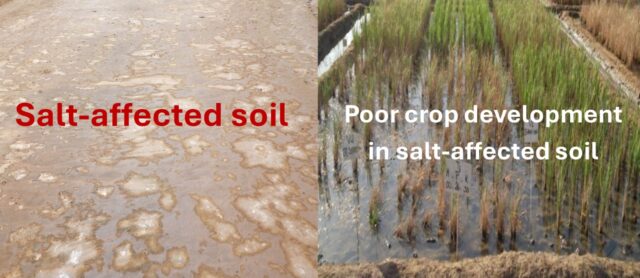
Turning the tide
To turn the tide, AfricaRice and MetaMeta are joining efforts through a new initiative, focusing on joint learning to raise awareness and strengthen capacity on cost-effective farm solutions for salinity. Funded by the Netherlands Food Partnership, their latest project “ISSM4RICE: Integrated Soil Salinity Management in RICE-based cropping systems in the delta of Senegal River Valley” will build upon AfricaRice extensive experience in integrated soil salinity management in rice-based cropping systems in the region. Through the partnership, it is aimed to empower farmers and extension agents with cost-effective solutions to combat salinity issues, contributing to reducing poverty, achieving food and nutrition security, and improving the livelihoods of rice value chain actors in Africa. The project will be concluded in early 2025 with an online closing event,
Project lay-out
The project consists of three key work packages designed to address the critical issue of soil salinity in irrigated rice production systems. The first work package involves demonstrations of integrated salinity management options through farmer field schools, focusing on practical applications and increasing awareness to help farmers and extension services apply adaptive salinity management technologies. The second work package focuses on knowledge co-creation, compiling a comprehensive knowledge product that provides a practical overview of effective salinity technologies specific to the Senegal River Valley. The third work package is dedicated to capacity strengthening through exchange visits and stakeholder facilitation sessions to enhance dialogue and learning among various stakeholders. In early 2025, an open webinar will be organised and hosted on TheWaterChannel, in which outcomes from the farmer field schools/pilots will be presented, and the final co-created knowledge product will be launched.

This blog is part of a series on integrated soil salinity management in rice-based cropping systems in the delta of Senegal river valley, produced under the ISSM-4-RICE project, funded via the Saline Water & Food Systems Partnership, supported by the Ministry of Agriculture, Nature and Food Quality of the Netherlands.
